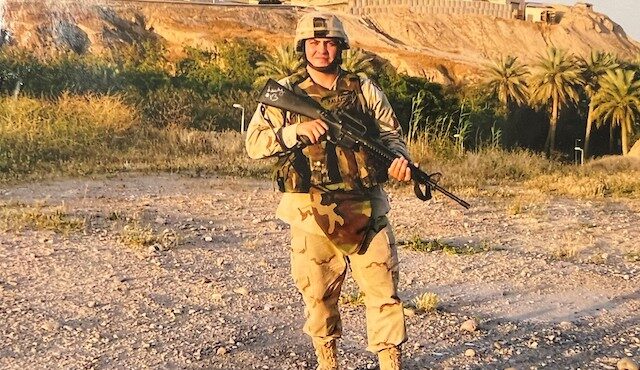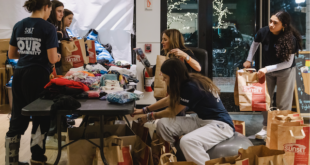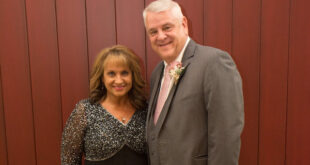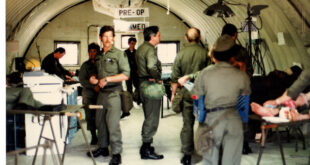Serving in the Air National Guard while working for Southwest Airlines, Salvatore Palazzolo went from ongoing training and playing video war games to the realities of combat in the wake of 9/11.
The eldest of four children, Salvatore Palazzolo was born in Chicago to Paolo and Giuseppa (Leone) Palazzolo. Salvatore’s parents emigrated from Cinisi, a small town in Sicily, to Elmwood Park in 1976. They later moved to River Grove, where Palazzolo grew up. Most of his father’s family lived in the surrounding area. “We were all close,” says Palazzolo.
The family ate Sunday dinner together at home or at his grandfather’s house. “We always did the traditional ‘sit at the table’ eating pasta with sugo: sauce, not gravy,” Palazzolo chuckles. He loved his mother’s “plain sauce,” saying, “I liked that, spaghetti with plain sauce.” Another favorite was pignolata, a fried-pastry treat served during the holidays.
Palazzolo graduated from River Grove grade school and went to East Leyden High School. “For the first time, teachers were able to say my name correctly because I was in Italian class,” he says. Palazzolo graduated in 1995 and began working the baggage ramp for United Airlines in 1996. “I always wanted to work in the airlines,” he explains.
While he was at work, Palazzolo noticed the military planes and remembered as a child looking at photos of his dad dressed in his Italian military uniform, thinking he might want to do that. That memory, along with his love of scouting and being outdoors, prompted him to join the military. The Navy and Marines turned him down because of his peanut allergy, so Palazzolo walked down to the Air National Guard at O’Hare and joined. His dad was happy; his mom was worried, afraid. Palazzolo told her, “Mom, I want to do it, not just for me but I want to serve my country.”
Palazzolo completed basic training at Lackland Air Force Base, Texas, in July 1998; technical training at Sheppard Air Force Base, Texas; and combat survival school in Spokane, Washington. He was assigned to the 126th Air Refueling Wing. Palazzolo’s job was air-crew life support on the KC-135, a tanker, basically a gas station in the sky. He fitted pilots for their helmets, G-suits and survival gear. “Any safety-related equipment that we put on the airplane for them, it was our job to inspect it,” Palazzolo says. “I loved it because I was part of the air crew.”
He continued working for United Airlines as he remained active in the Air National Guard, based at O’Hare. Palazzolo trained one weekend a month and two weeks during the summer. After two years, his unit transferred to Scott Air Force Base in Belleville, four hours away. Consequently, in 2000, Palazzolo transferred to the Army National Guard based in Chicago, HHB 2/202.
He trained at Fort Campbell, Kentucky, as a man-portable air-defense system crew member, 14 Mike. “I basically had a missile over my shoulder,” Palazzolo says. He also became the commander’s driver. During this time, Palazzolo became a flight attendant for Southwest Airlines. He vividly recalls driving to Midway Airport the morning of 9/11, arriving to find the airport closed. Surprised and confused, he turned back and soon learned of the horrific terrorist attack on our country. “And that began my journey to get ready to get deployed,” says Palazzolo. “It was one of those things, we were getting prepped. We knew that our unit was going to get deployed.”
A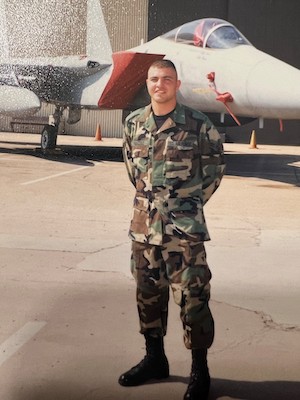 ttached to Golf Battery out of Marseilles, Illinois, his unit was activated in October 2003; trained for war at Fort Stewart, Georgia; and deployed to Kuwait in January 2004. “I was scared because you’re always like, ‘What’s going to happen?’” Palazzolo says. “But I know I was prepared with my training.” Traveling in a convoy to Iraq, Palazzolo got his first taste of war. “We heard a big explosion. It was away from me but we felt the shock of it and I’m like, ‘This is real, this is real,’” he says. “It wasn’t a video game, there’s no reset button.”
ttached to Golf Battery out of Marseilles, Illinois, his unit was activated in October 2003; trained for war at Fort Stewart, Georgia; and deployed to Kuwait in January 2004. “I was scared because you’re always like, ‘What’s going to happen?’” Palazzolo says. “But I know I was prepared with my training.” Traveling in a convoy to Iraq, Palazzolo got his first taste of war. “We heard a big explosion. It was away from me but we felt the shock of it and I’m like, ‘This is real, this is real,’” he says. “It wasn’t a video game, there’s no reset button.”
Palazzolo was based at Camp Caldwell, approximately 70 miles east of Baghdad, close to the Iranian border, his home for the next 18 months. Living conditions were crude at first. “We slept in tents and the sandstorms and windstorms were so strong they actually pulled our tent off,” Palazzolo says. They eventually moved into buildings. The sounds of small-arms fire and exploding bombs were constant. “They tried to attack our base,” says Palazzolo, “but our guys who did the check-around, they pretty much made sure that they stopped those guys.”
As the commander’s driver, Palazzolo manned a Humvee in a team of a minimum of four vehicles. The convoy was led by a security team, followed by Palazzolo with his commander, a doctor, nurse and sometimes another officer. Bringing up the rear were two vehicles carrying a maintenance crew and security crew, respectively. The convoy could contain numerous other vehicles carrying troops, ammo, weaponry or supplies, depending on the mission.
Palazzolo went on missions for three or four days at a time, transporting the Iraqi National Guard or other troops that were coming in and out of the base.
The convoy was always under small-arms fire. “It was like a routine thing but we would always be ready,” Palazzolo says. “I was an aggressive, defensive driver. I made sure I kept my commander and the people in my vehicle safe.” They were especially vulnerable crossing rivers. “We had the Marines there, who would do the protection for us when we crossed over the bridge,” says Palazzolo.
June 24, 2004, is a date that Palazzolo will forever remember. “We swapped missions, and then I had to go pick up their bodies and I was like, ‘Wow, that was supposed to be me!’” Palazzolo says. Thinking about the countless missions, always under fire, the destruction, the smells, Palazzolo says, “I saw things that I don’t want to see again. When you see little children, babies that are not here with us, that’s something that I never want to see or do anymore.”
Palazzolo returned to the States in March 2005 and moved from Orlando to Chicago to be with family. No longer employed with Southwest and fresh from combat, he tried various jobs and became an auxiliary police officer. Discharged from the Army National Guard in May 2006 as an E4 Specialist, he eventually became a flight attendant with American Airlines. Palazzolo is also a part-time police officer with the Wauconda Marine Patrol Unit.
Palazzolo has one son; flies out of Charlotte, North Carolina; and lives in Chicago. Reflecting on his military experience, he says, “There were moments that were tough when I was in war, but I would never take that back,” noting that, “Here I am born in the U.S., my parents are from Italy. I joined the military to protect and serve my country; I loved being a soldier and I’m proud of it.”
The above appears in the April 2024 issue of the print version of Fra Noi. Our gorgeous, monthly magazine contains a veritable feast of news and views, profiles and features, entertainment and culture. To subscribe, click here.
 Fra Noi Embrace Your Inner Italian
Fra Noi Embrace Your Inner Italian


